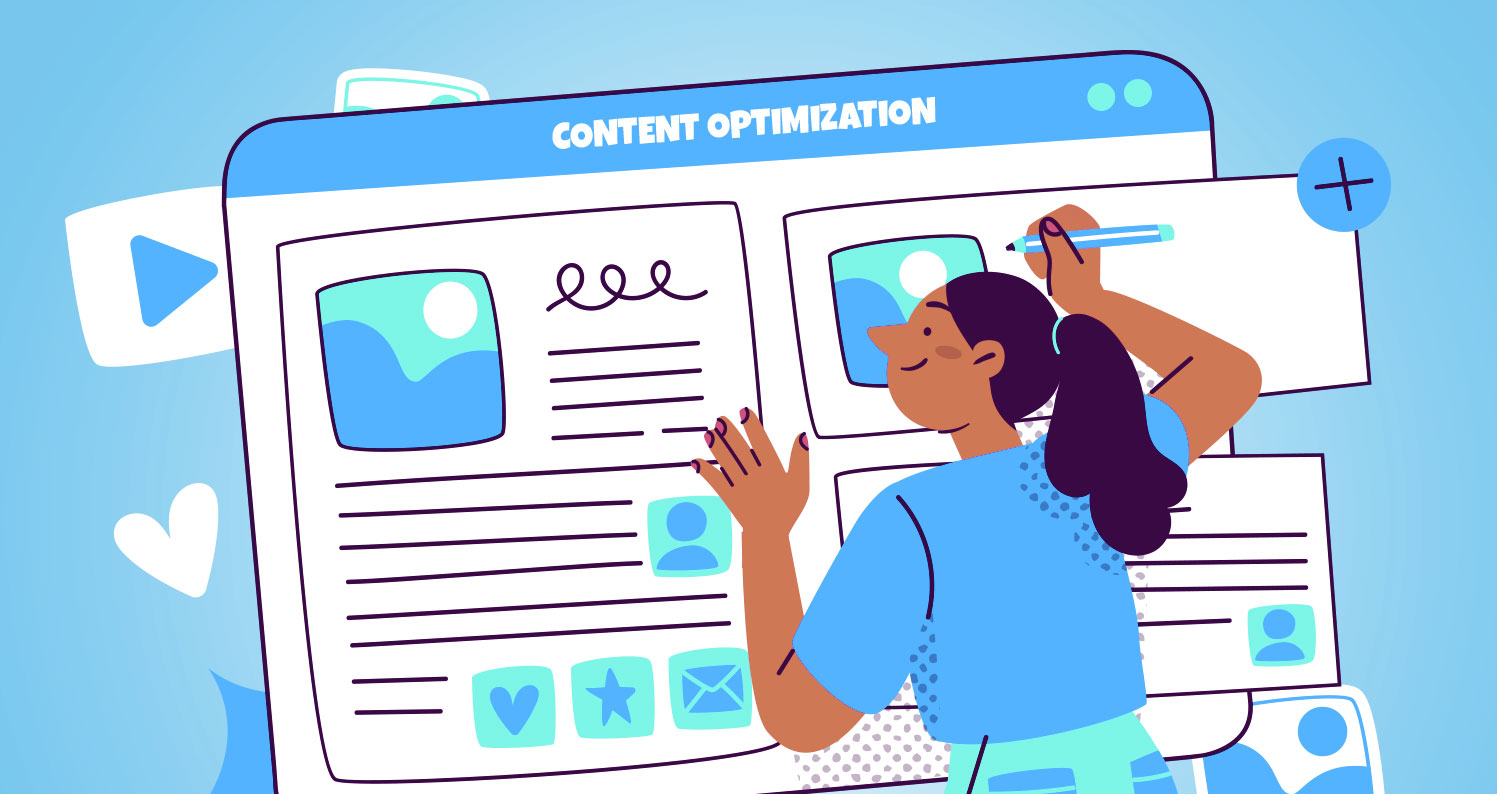SEO 101: Search Engine Optimization Basics
See how search engines rank websites and get pro tips to boost your visibility. We cover the basics of SEO in this beginner-friendly guide.

Having a website is like opening a store, but what’s the point if no one knows it exists?
Creating a website is just the beginning. The real challenge lies in ensuring your audience can find it. That’s where search engine optimization (SEO) comes in.
Whether you’re a small business owner, a marketer, or just starting your online journey, understanding SEO is essential for driving traffic, increasing visibility, and connecting with your target audience.
This guide covers SEO basics, explaining how search engines rank websites and providing steps to help you build a strong foundation for long-term success.
What is SEO and why does it matter?
SEO is the process of improving your website so search engines can easily find, understand, and rank your content.
At its core, SEO ensures your site is visible to the right audience at the right time—when they’re actively searching for the products, services, or information you provide.
But SEO isn’t just about search engines. It’s also about creating a website that’s helpful, user friendly, and valuable to visitors.
Let’s break it down further.
What’s the core purpose of SEO?
Search engines like Google aim to deliver the most relevant and high-quality results for any given search. SEO helps your website meet these expectations by optimizing key elements:
- Keywords: Words and phrases your audience uses in their search queries.
- Content: Valuable, engaging, and accurate information.
- Technical Structure: A fast, secure, and easy-to-navigate site.
By optimizing these factors, SEO bridges the gap between your website and your audience, helping you stand out in search results.
What’s SEO’s role in search engine rankings?
Search engines use complex algorithms to evaluate and rank websites based on factors such as:
- Relevance: How closely your content matches a search query.
- Authority: The number and quality of other websites linking to yours.
- Technical Health: The performance, speed, and security of your website.
- User Signals: Metrics like time spent on your site, click-through rates, and bounce rates.
These elements work together to determine your site’s position in search results.
Next, let’s dive into some actionable strategies!
Getting started with on-page SEO.
Understanding why SEO matters is the first step. Now, it’s time to put that knowledge into action.
Whether you’re a beginner updating an existing site or starting from scratch, focusing on a few key areas can make a big difference in your website’s visibility and performance.
By prioritizing strategies like keyword research, content optimization, and technical improvements, you can create a solid foundation for long-term SEO success.
Let’s start with one of the first and most critical steps.

Keyword research is a great starting point for SEO strategy.
Keyword Research
What is keyword research?
Keyword research involves identifying the specific words and phrases your audience uses to find what you offer.
It forms the foundation of your SEO strategy by aligning your content with your audience’s needs and interests. This enhances the relevance of your content and makes it easier for search engines to rank your site effectively.
Think of it as your SEO compass, guiding your efforts in the right direction so you can connect with the people who matter most.
Why is keyword research important?
- Reveals audience intent. Understand why people are searching and create content that meets their needs.
- Ensures content gets found. Target the right keywords to make your site more visible in search results.
- Highlights opportunities. Integrate high-volume, low-competition keywords into your strategy to stand out.
How do you conduct keyword research?
- Use reliable tools. Start with tools like Google Keyword Planner or a reputable paid tool.
- Focus on intent. Match keywords to what your audience is seeking. Are they researching, buying, or learning?
- Incorporate naturally. Seamlessly include keywords in your titles, headings, and content.
- Embrace variations. Use long-tail keywords or related terms to target specific searches.
- Keep it fresh. Regularly update your keyword list to adapt to trends.
By using well-researched keywords in your content, you make it helpful for readers and good for search engines.
Pro Tip: Avoid keyword stuffing. It’s frustrating for readers and can lead to penalties. Ethical SEO strategies tend to yield far better results.

High-quality, helpful content remains a cornerstone to successful on-site SEO.
Content Optimization
What is content optimization?
Content optimization involves crafting content that’s engaging for your audience and easy for search engines to understand.
Imagine you’ve created amazing content without optimization. It’s like hiding a fantastic book on a dusty back shelf.
Optimization ensures your hard work gets noticed. By crafting content that is clear, visually appealing, and keyword-rich, you’ll attract readers while signaling to search engines that your site is authoritative and worthy of higher rankings.
Why is content optimization important?
Content optimization ensures your hard work gets noticed. Here’s why it matters:
- Keeps visitors engaged. High-quality, relevant content encourages users to stay on your site longer, increasing the chances they’ll explore or act.
- Improves readability. A well-structured page with clear headings and logical flow makes it easy for users to find what they need and keeps them coming back.
- Boosts rankings. Search engines prioritize content that’s useful, well-organized, and keyword-rich, helping your site climb higher in search results.
How can you optimize your content effectively?
- Solve your audience’s problems. Focus on creating content that answers questions or provides solutions your audience is actively searching for.
- Organize with clear headings. Break your content into sections using descriptive headings (H1, H2, etc.) that incorporate keywords naturally.
- Add visuals for impact. Use images, videos, or infographics to make your content more engaging and easier to understand.
- Write unique meta titles and descriptions. These are the first things users see in search results. Make them compelling, concise, and keyword focused.
- Link to related pages. Help users navigate your site by linking to relevant pages, improving their experience and your site’s structure.
By optimizing your content, you create a win-win. Your audience enjoys a better experience, and search engines recognize your site as valuable and worth ranking higher.
Start small and stay helpful to see big results!

Address technical SEO opportunities for better site performance and stronger online presence.
Technical SEO
What is technical SEO?
Technical SEO is all about keeping your website running like a well-oiled machine. It’s the behind-the-scenes work that makes sure search engines can crawl and index your site easily while giving visitors a seamless experience.
Think of it as the engine under your hood, when everything’s in top shape, your site runs faster, ranks higher, and leaves a great impression on users.
Why is technical SEO important?
Technical SEO is essential because it ensures search engines can effectively crawl and index your site, improving accessibility and visibility.
It ties into all aspects of your site’s functionality, including usability, regional targeting, security, and more.
For instance, secure websites with HTTPS build trust, earning higher rankings and boosting user confidence.
Technical optimizations may also enhance user experience by delivering faster load times and optimizing for mobile devices, which helps keep visitors engaged.
What are five ways to improve your site through technical SEO?
- Speed up your site. Compress images and clean up unnecessary scripts using tools like Google PageSpeed Insights.
- Ensure mobile friendliness. Use Google Lighthouse to identify issues that can be fixed with responsive design and optimized layouts.
- Secure your site. Use HTTPS on all pages and resources for better rankings and user trust.
- Fix errors. Scan for broken links and 404 errors to repair them.
- Submit a sitemap. Help Google index your site by submitting an XML sitemap to Google Search Console.
A solid technical foundation ensures your site is accessible, trustworthy, and primed for long-term success.
On-page SEO doesn’t have to be overwhelming. Start with the basics—research your keywords, optimize your content, fix technical issues, and watch your site improve.
These strategies are simple, effective, and a great starting point for building a strong online presence.
Have you considered expert SEO services?
With SEO, even the basics can feel overwhelming—especially for people new to the space.
When you partner with an SEO agency, you don’t have to go it alone. You can reap the benefits of collective experience and best-in-class industry technology as you grow your brand online.
Gen3 specializes in delivering tailored SEO services that drive real, measurable results. Whether you’re fine-tuning the basics or addressing complex technical challenges, our experienced team is equipped to handle every aspect of SEO.
From small business websites to expansive, multi-page platforms, we craft scalable strategies designed to meet your specific goals.
Ready to elevate your SEO game? Contact us today and discover how we can help your business grow.
More Blogs
Ecommerce Search Optimization Checklist
Get your online store SEO, GEO, and AEO ready with this helpful checklist from a digital search expert.The ecommerce landscape is changing fast. Search engines now blend traditional ranking signals with AI-generated answers, localized results, and real-time product...
Psychological Safety: How it Drives Better Marketing Solutions
Fostering an environment where team members feel psychologically and emotionally safe leads to better marketing outcomes.As agency work environments grow more flexible, workplace culture must evolve as well. For agencies, like Gen3 Marketing, who strive to deliver...
How AI & Voice Commerce Are Changing Affiliate Marketing
Artificial Intelligence (AI) and voice commerce are changing the affiliate marketing channel. Learn how you can capitalize on the new opportunities offered by these technologies.Artificial intelligence and voice commerce are transforming how consumers discover and...

 By
By 

